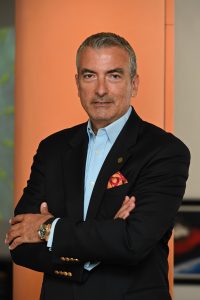
A John Kanellopoulos MD
Thanks to a swift, aggressive government response to early cases of COVID-19 in Greece that commenced on March 15, this southern European country of 10.72 million people saw far less morbidity and mortality from the coronavirus infection than many other nations. Consequently, Greece was also one of the first countries to see restrictions eased.
Despite the absence of a mandate, A John Kanellopoulos MD, Director, Laservision Eye Institute, Athens, Greece, chose from March 1 to voluntarily stop performing all elective surgeries at his centre and enforce spacing between patient exams along with wearing of facial masks and gloves for all. By mid-May, just a few weeks after the beginning of staged lifting of COVID-19 restrictions, he was already seeing patients for laser vision correction (LVC) consultation visits and performing his first operations.
Considering the level of patient interest and the value of laser refractive surgery, Dr Kanellopoulos is hopeful about its future.
“If we do not let our guard down and remain dedicated to delivering safe and ethical care, I believe the volume of LVC will return to the pre-pandemic state,” he told
EuroTimes.
“The timing will be influenced by what course the pandemic follows over the next few months, if there is a resurgence of cases in the fall and what modalities emerge for treating and preventing COVID-19. Meanwhile, I encourage my colleagues to be optimistic and continue to offer the best of our services because I believe that LVC provides patients a safer option for refractive correction than contact lens wear and is a highly rewarding component of our careers.”
Pandemic impact on patient perceptions
Dr Kanellopoulos recalled that during the lockdown period in Greece, he was contacted by several patients who were interested in LVC because they felt the “down time” they had from work and other usual activities offered an opportune time to undergo the surgery.
He also postulated that the stay-at-home situation itself, may have fuelled interest in LVC.
“With more unoccupied time, some individuals may have focused more on difficulties they were having with contact lenses and/or self-reflected on making lifestyle changes,” Dr Kanellopoulos explained.
“With safety in mind, we kindly deferred and postponed requests to perform surgery during the lockdown, parallel to this we counselled patients to try to refrain from wearing contact lenses considering that they may become a mode of transmission for the coronavirus.”
Resuming operations
Although in general, people in Greece are still somehow limiting some of their elective and leisure activities, including choosing to undergo various elective surgeries, Dr Kanellopoulos said that he is seeing an increased interest in LVC relative to the past.
“Although my surgical volume has not returned to what it was a year ago at this same time, the proportion of my surgical population that is interested in LVC has grown,” he said.
“Previously, laser refractive surgery accounted for approximately one-third of my surgical practice. Now almost half of the patients I see are interested in updating their contact lens prescription and very interested in LVC. Some patients are travelling from other EU countries and even from the United States!”
Dr Kanellopoulos suggested the “surge” may have been enhanced by his having incorporated ray-tracing customisation and excellent early results since November 2019 using an artificial intelligence platform that combines wavefront, Scheimpflug tomography and interferometry measurements from a single device.
New processes
Implementation of measures to minimise risk for virus transmission is critical so that patients are comfortable coming in for a consultation visit and proceeding with surgery. The changes include wearing of surgical face masks at all times-by all staff, breath shields on all slit-lamps, and reconfiguration of the waiting area to maintain social distancing among others.
Prior to their visit, patients are carefully screened for infection or recent exposure to COVID-19. At entry into the building, they are given disposable masks and gloves to wear and must clean their shoes with a disinfectant solution. In addition, adult patients must be unaccompanied unless they require assistance for ambulation or another issue.
“We recognise, however, that in making the decision to undergo surgery and for support postoperatively, many patients rely on an informed family member or friend. Therefore, we have employed extraordinary measures using videoconferencing and live, private online broadcasting of each surgery to fulfil this need,” Dr Kanellopoulos said.
“Our team’s high standards and my personal quest in offering excellence in patient care has been the driving force in rebooting refractive surgery in our practice post COVID-19. I personally have found the great majority of patients to have ‘returned’ to normalcy with a more heartfelt physician-patient relationship, and I am thrilled!”
[embed]https://youtu.be/gy-LpEoD114[/embed]
[embed]https://youtu.be/jK2pwq8_bLA[/embed]
[embed]https://youtu.be/TDcHa4dU6wA[/embed]

 A John Kanellopoulos MD
A John Kanellopoulos MD